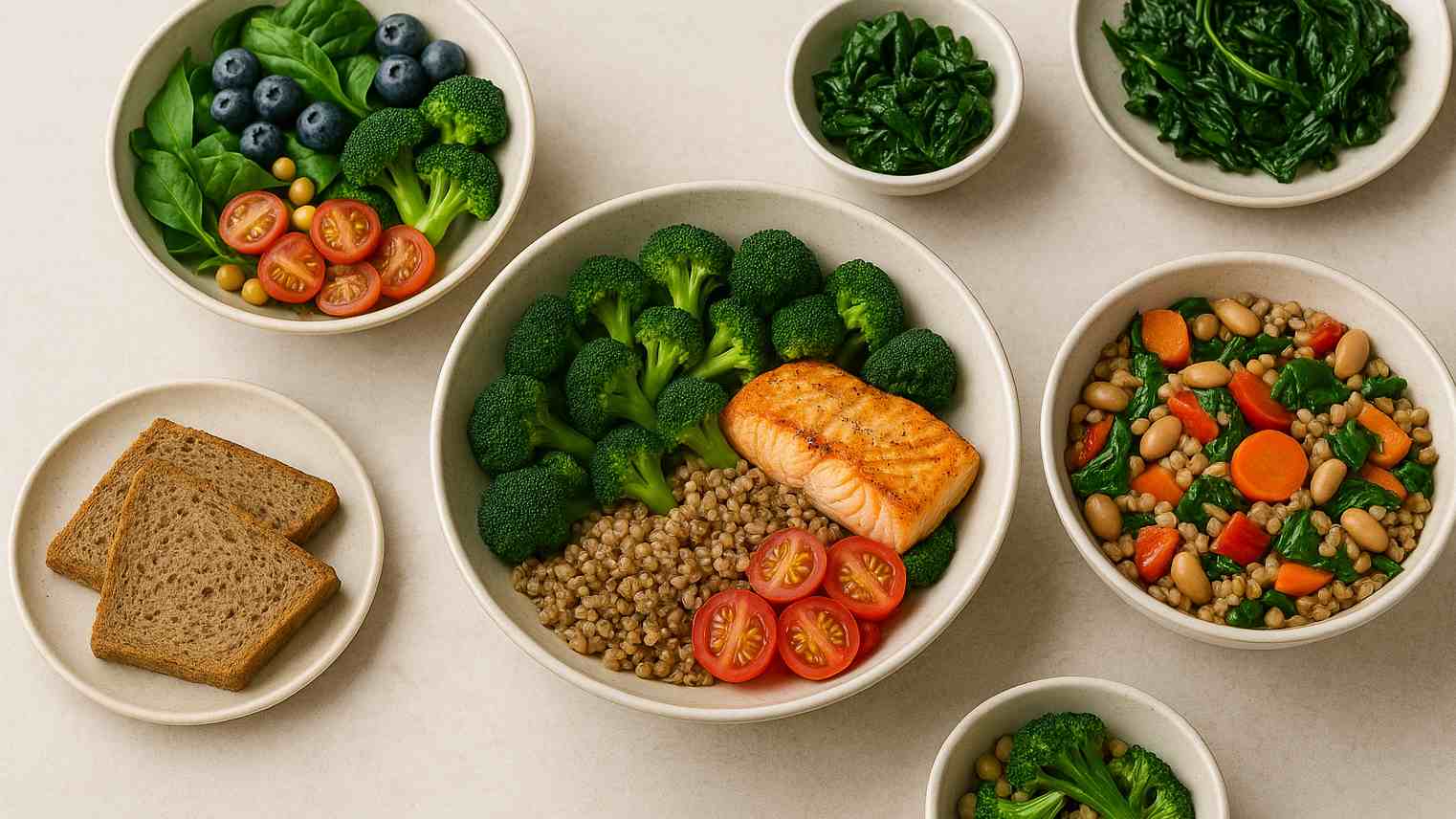As we age, keeping our brains sharp and healthy becomes a top priority. With Alzheimer’s disease and other memory-related issues on the rise, people are searching for ways to protect their minds. Enter the MIND diet — a brain health approach that’s both simple and science-based. This eating plan is designed to support your brain and lower the risk of cognitive problems.
The MIND diet stands for Mediterranean-DASH Intervention for Neurodegenerative Delay. It combines the best parts of two well-known diets: the Mediterranean diet and the DASH diet (Dietary Approaches to Stop Hypertension). It has gained attention from doctors and nutritionists because it focuses on foods that nourish the brain while being easy to follow.
Alzheimer’s and other neurological diseases affect millions, and the numbers are growing. These conditions can rob people of their memories, independence, and quality of life. While there’s no guaranteed way to prevent them, research shows that diet can make a big difference. The MIND diet stands out as a powerful tool to keep your brain healthy and delay cognitive decline. In this article, we’ll explore what makes this diet special, which foods to eat, which to avoid, and how the MIND diet can protect your brain for years to come.
What Makes the MIND Diet a Neuroprotective Powerhouse?
The MIND diet isn’t just another trend — it’s a neuroprotective plan built on solid science. It targets brain health by focusing on foods that reduce two major culprits behind brain aging: oxidative stress and inflammation. Oxidative stress happens when harmful molecules damage brain cells, while inflammation can harm brain tissue over time and increase the risk of memory loss and neurological diseases. The MIND diet fights both by filling your plate with nutrient-rich foods that protect and support brain function.
The diet emphasizes 10 brain-healthy food groups while limiting five unhealthy ones. Here’s a quick look at the key players:
- Leafy greens. Packed with vitamins like folate and vitamin K, which support brain cell health.
- Other vegetables. Provide antioxidants that protect against cell damage.
- Berries. Rich in compounds that improve memory and reduce inflammation.
- Nuts. Full of healthy fats and vitamin E, which shield brain cells.
- Whole grains. Offer steady energy for brain function and reduce inflammation.
- Fish. High in omega-3 fatty acids, which strengthen brain cell connections.
- Poultry. A lean protein source that supports overall health without harming the brain.
- Olive oil. A healthy fat that reduces inflammation and supports blood flow to the brain.
- Beans. Provide fiber and nutrients that keep blood vessels healthy.
- Wine (in moderation). Small amounts of red wine may offer antioxidants for brain protection.
Each of these foods delivers specific nutrients like antioxidants, healthy fats, and vitamins. A neuroprotective MIND diet keeps your brain strong, flexible, and resilient against age-related decline.
Top Brain-Boosting Foods in the MIND Diet
If you’re ready to build a healthy brain plan, the MIND diet makes it simple by focusing on delicious, nutrient-packed foods. Here’s a closer look at the top foods and why they’re so good for your brain:
- Leafy greens. Think spinach, kale, or collard greens. These vegetables are loaded with folate, vitamin K, and beta-carotene, which help maintain brain cell health and improve memory.
- Berries. Blueberries and strawberries are superstars because they contain antioxidants called flavonoids. These compounds boost memory and protect against brain cell damage.
- Nuts. Almonds, walnuts, and other nuts are rich in vitamin E and healthy fats. For a healthy brain diet plan, these foods can protect brain cells from oxidative stress and keep your mind sharp.
- Whole grains. Oatmeal, quinoa, and brown rice provide steady energy for your brain while helping reduce inflammation that can harm mental function.
- Fish. Salmon, mackerel, and tuna are packed with omega-3 fatty acids. These fats strengthen connections between brain cells, supporting learning and memory.
By eating these foods regularly — at least the recommended amounts, like six servings of leafy greens or two servings of berries per week — you’re giving your brain the nutrients it needs to thrive.
What to Limit: Foods That Hinder Cognitive Health
The MIND diet isn’t just about what to eat — it’s also about what to avoid. Certain nutrition can accelerate cognitive decline by promoting inflammation, clogging arteries, or harming brain cells. The diet limits five main culprits:
- Red meat. Too much beef or pork can raise inflammation and harm blood vessels that supply the brain.
- Butter and margarine. These are high in unhealthy fats that can clog arteries and reduce blood flow to the brain.
- Cheese. While tasty, cheese is often high in saturated fat, which can contribute to cognitive decline if eaten in excess.
- Sweets and pastries. Sugary treats spike blood sugar and promote inflammation, which can damage brain cells over time.
- Fried and fast food. These are loaded with unhealthy fats and chemicals that increase oxidative stress and harm brain health.
Cutting back on these foods doesn’t mean giving them up entirely. However, the MIND diet encourages you to keep them to a minimum. For example, aim for less than one serving of fried food per week and fewer than five servings of sweets. This shift represents more than just a diet — it’s a lifestyle change that promotes better brain aging and overall health.
How the MIND Diet May Lower the Risk of Alzheimer’s
One of the most exciting aspects of the MIND diet is its potential for Alzheimer’s prevention. Studies, like those from Rush University, have shown that people who follow the MIND diet closely can lower their risk of Alzheimer’s by up to 53%. Even those who follow it moderately see a 35% lower risk. These numbers are impressive because they show that you don’t need to be perfect to benefit — just making smarter food choices can make a big difference.
The diet works by protecting the brain in multiple ways. Its focus on antioxidant-rich foods like berries and leafy greens reduces damage to brain cells. Healthy fats from fish and nuts support strong brain cell connections, while limiting unhealthy foods reduces inflammation and improves blood flow. Together, these changes create an environment where the brain can stay healthier for longer, potentially delaying or preventing Alzheimer’s. The best part? You don’t need to overhaul your life overnight — even small steps toward the MIND diet can offer real protection.
The Broader Benefits: How the MIND Diet Supports Long-Term Brain Health
Beyond Alzheimer’s, the MIND diet benefits extend to overall brain health. It’s not just about preventing one disease — it’s about keeping your mind sharp and resilient as you age. Research suggests that the diet can improve memory, sharpen focus, and slow the aging of brain cells while also reducing the risk of other conditions linked to diet and neurodegeneration, such as Parkinson’s disease or general cognitive decline.
For example, the omega-3s in fish and the antioxidants in berries help maintain clear thinking and better recall. Whole grains and beans keep blood sugar stable, preventing energy crashes that affect focus. By eating this way, you’re not just protecting against disease — you’re investing in a brain that stays quick, creative, and healthy well into your later years. The MIND diet is sustainable because it’s flexible and full of foods you already enjoy, making it an easy choice for long-term cognitive health.
Simple MIND Diet Plan to Start Today
Ready to try the MIND diet? Here’s a sample one-day healthy brain diet plan to get you started. It’s simple, tasty, and packed with brain-boosting foods.
Breakfast:
- Oatmeal topped with fresh blueberries and a handful of walnuts
- A cup of green tea or black coffee (no sugar)
Morning Snack:
- A small handful of almonds
- A sliced apple
Lunch:
- Grilled salmon (a key component of the MIND brain health diet) with a side of spinach and kale salad dressed with olive oil and lemon
- Serve with a slice of whole-grain bread
- A glass of water or unsweetened iced tea
Afternoon Snack:
- A cup of sliced strawberries
- A few baby carrots with hummus
Dinner:
- Baked chicken breast with roasted broccoli and quinoa
- A glass of red wine (optional, one small glass) or sparkling water
This diet for Alzheimer’s prevention is easy to adapt to your tastes. Swap salmon for tuna, quinoa for brown rice, or berries for your favorite fruit. The key is to focus on the 10 brain-healthy food groups and keep unhealthy foods to a minimum. Start small — try one or two MIND diet meals a week and build from there. Your brain will thank you.
By following the MIND diet, you’re not just eating for today — you’re building a stronger, healthier brain for tomorrow. Whether you’re worried about Alzheimer’s or just want to stay sharp, this diet offers a practical, delicious way to support your mind for years to come.












I've given up... the stress her office staff has put me through is just not worth it. You can do so much better, please clean house, either change out your office staff, or find a way for them to be more efficient please. You have to do something. This is not how you want to run your practice. It leaves a very bad impression on your business.
Please, leave your review
Write a comment: